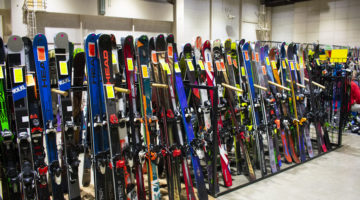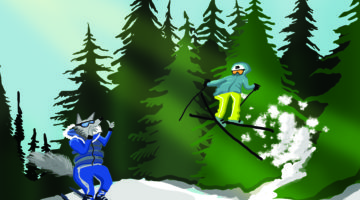
Photo courtesy of Nico Monforte
Nico Monforte races in the Far West FIS Slalom race at Heavenly ski resort in Lake Tahoe in the spring of 2012. Monforte broke his Tibia and Fibula in the spring of 2014.
by Jack Rieger
The definition of “club,” according to Google, is “an association or organization dedicated to a particular interest or activity.” As many college students can tell you, universities have all sorts of clubs. There’s the “Nevada Students for Hillary” club, whose sole purpose is to promote presidential candidate Hillary Clinton. There’s the “Puzzle Club,” where members meet the first and third Tuesday of every month to assemble and discuss — you guessed it — puzzles. There’s even a “Magic TCG Club” whose members meet to analyze and debate a surprisingly popular card game created in 1993.
Clubs serve an important purpose for college students. As young people mature, they are exposed to new experiences and develop unique interests. Clubs act as a platform for those curiosities, providing resources and people interested in similar activities as you.
But where is the line drawn between a club and something like a football team? It would be inaccurate to refer to the Nevada football team as a club because of its financial support, and more importantly, its label as an NCAA team. It operates more like a business that partners with the NCAA, with the primary goal being to win, and hopefully, to turn a profit in the process.
One athletic club attempting to make the leap from club status to an official NCAA team is the Winter Sports Club, which consists of a skiing and snowboarding team. The club was created in 1936 by Wayne Poulsen, who was also one of the original creators of Squaw Valley in Lake Tahoe. In the ’50s, Poulsen convinced the NCAA to establish the club as an official NCAA team. Except for a period in the ’80s and ’90s, the Nevada ski team retained its NCAA label until the economic recession of 2008, when the athletic department decided to drop skiing as a varsity sport.
The team’s demotion to the club level has been challenging for the program. It lost its ability to offer scholarships to team members, it no longer has access to Nevada facilities, and it isn’t excused from class for competitions. The club’s current alpine captain, Nico Monforte, explained how difficult recruiting is without the school’s support.
“We’re losing local athletes for sure because we can’t offer them full scholarships for tuition or to pay for their competition expenses,” said Monforte. “It’s been a little frustrating since I’ve been here. There’s a lot of talk within the team along with our boosters, but what we’re really struggling with is a clear path to what we need to do to get the recognition.”
Monforte was respectful of the university’s decision to demote the club, but he also pointed out the school’s lack of support.
“I think the effort is there, but the actual steps the school has given us isn’t there,“ Monforte said.
Monforte is one of the most talented skiers in the United States, having competed with the national ski cross team as a senior in high school. He also competed at the junior world championships for team USA. He was convinced to come to Nevada because of the opportunity to lead a program he’s looked up to since he was a kid growing up in Squaw Valley.

Photo courtesy of Nico Monforte
Nico Monforte races in the North American Skicross tour in Mount Hood, Oregon during the 2013 /2014 season. Mt. Hood Meadows is the largest and most popular resort in Oregon.
Monforte’s frustrations with the university in regards to establishing the club as an NCAA team are legitimate for a few reasons. Firstly, local boosters have supported the Winter Sports Club financially for many years, including after the university dropped the team following the 2008 season, meaning there are many people invested in the club’s future.
More importantly, the club is within an hour drive of one of the most prestigious ski destinations in the world — Lake Tahoe. Of any sport at Nevada, you would assume skiing has the greatest potential for success because of the proximity to Lake Tahoe, which is a breeding ground for skiing prodigies and home to the nicest ski facilities in North America. Instead of taking advantage of the club’s geographical advantages, the university remains unwilling to encourage the Winter Sports Club’s potential.
Monforte, who just recovered from a broken tibia and fibula suffered on a warm-up run in Italy last year, has set high personal goals for the upcoming season.
“I’d like to be on the podium at our local conference races, and then have top-five results in nationals,” said Monforte.
Despite the lack of support from the university, Monforte has also set high goals for the team, whose season begins on Jan. 16.
“Our team goal is to qualify for a spot at Nationals in Lake Placid, New York and to be competitive,” Monforte said. “A lot of other schools have a lot more support, so for us, being the underdogs, I want to see us pull off some good results.”
While the Winter Sports Club isn’t an NCAA team and doesn’t have financial support from the university, its label as a club doesn’t quite do it justice. The team’s priority is to be competitive and to go to nationals, with or without the support of its university.
Jack Rieger can be reached at jrieger@sagebrush.unr.edu and on Twitter @JackRieger.












